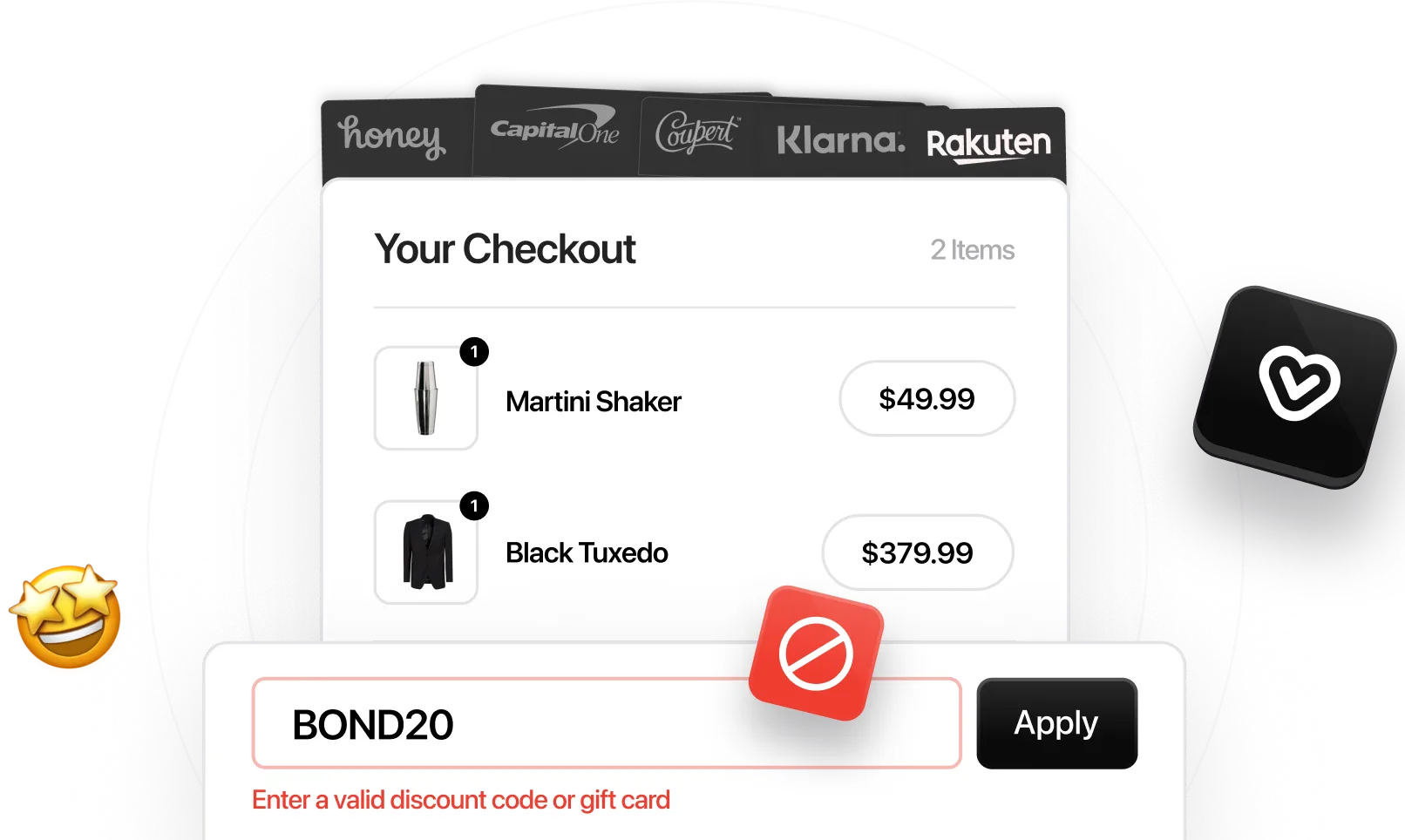What Happened
Leading up to the week of Thanksgiving, sales across the Coupon Blocker™ network followed normal patterns. As the holiday approached, transaction volumes began to slowly escalate, culminating in a 145% increase in gross sales.
In response to this, most retailers tightened up their coupon code strategy prior to the holiday weekend, resulting in an overall decrease in discounts per cart over the long shopping weekend.

But even as brands attempted to reign in their discounts, improper redemption attempts from blocked coupons increased by 139%, resulting in a 154% increase in recovered revenue (that otherwise would have been lost due to coupon extensions) for brands using Coupon Blocker™, or roughly $200,000 in averted losses across the long weekend.
Overall Recovered Revenue x Gross Sales With Blocking


We also observed an increase in Cart Completion Rates for Coupon Blocker™ users actively blocking coupon extensions, from 51% in November prior to the Holidays, to 57% during Black Friday/Cyber Monday (BFCM), and peaking at 61% on Cyber Monday.

This is significant because it indicates that customers attempting to obtain last minute discounts were still willing to complete their orders without successfully obtaining discounts from coupon extensions.
Honey and Capital One Shopping are the dominant players in the coupon extension ecosystem, owning roughly 65% of the market.
Over the course of the holiday weekend, coupon injection attempts by Honey increased 256% while Capital One Shopping increased 215% percent.


As coupon browser extensions continue to grow in popularity amongst shoppers, steep holiday weekend discounts and high traffic holidays leave online retailers particularly vulnerable to the financial harm caused by coupon abuse.
Looking at some of the most impacted retailers in our network, we can see that Store A saw large increases in blocked coupons surrounding holiday sales. Codes like Frozen 21 and Snow were picked up by coupon extensions, which increasingly attempted to automatically apply them at checkout throughout the week.
Store A Blocked Coupons By Volume


Because of this, Store A saw a massive 1450% spike in coupon injection attempts - potential revenue that otherwise would have been lost to discounts originating from coupon extensions on Black Friday.
Store A Recovered Revenue x Gross Sales With Blocking


Because Store A was using Coupon Blocker™ to prevent coupon extensions from applying discounts, they were able to recover nearly $40,000 in revenue.
In an example similar to Store A, Store B saw gradual increases in coupon attempts moving into the holiday weekend, with massive spikes on Cyber Monday.
Store B Blocked Coupons By Volume


Like Store A, Store B used Coupon Blocker™ to prevent these coupon codes from being automatically applied at checkout, resulting in a 200% increase in recovered revenue from coupon browser extensions.
Store B Recovered Revenue x Gross Sales With Blocking


These unprecedented black Friday spikes, and the growing popularity of online shopping, along with an increase in the number of shoppers using coupon extensions, highlight the risk that retailers face when they use coupon and discount codes during the holiday season.
In addition to revenue lost to coupons applied by extensions at checkout, another risk posed by coupon extensions is misattribution of sales. Specifically, coupon extensions may claim credit for sales they had no part in driving, and if you’re using an affiliate platform, this can result in artificially inflated commissions to coupon affiliates (not to mention data that might mislead you into doubling down on unprofitable marketing channels).
Over the long weekend we saw this exact problem, with Coupon Blocker™ customers experiencing a more than 100% increase in attempted affiliate commission claims (all of which were prevented by Coupon Blocker™ Affiliate Guard).


If left unchecked, these illegitimate coupon affiliate commissions, coupled with potential losses from unnecessary discounts, can have a devastating effect on the ability of online retailers to profit during the holiday season. .
Why it Matters
As these coupon extensions continue to grow in resources and popularity, the impact they can have on your overall revenue will grow at exponential rates.
Faulty attribution reporting, illegitimate affiliate fees, unnecessary discounts at checkout, and disrupted customer experiences can form a perfect storm that will cut deeply into your profits and cause you to over-invest in unprofitable marketing channels.
And the effect is compounding, with new coupon extensions entering the market and extensions now available on mobile browsers, where the majority of online shopping takes place.
At a time when supply chain constraints are hampering retailers’ ability to keep store shelves stocked, and platform changes such as iOS 14.5 are disrupting the ability to retarget customers via traditional performance marketing tools like Facebook ads, it’s critical that retailers have the ability to maximize ROI from the channels they CAN control - and that includes how coupon extensions interact with your website.
Research shows that blocking coupon extensions can increase eCommerce revenue by 4% or more - a significant amount at a time when margins are strained. Combine this with data showing that blocking extensions also improves cart completion and conversion rates and you can see why it’s so important for retailers to take action.
What You Need To Know
Holiday weekends are pivotal times for eCommerce retailers, and leaving your door open to coupon abuse and misattributed affiliate fees can quickly drain your margins and resources.
Spending time tracking down errant codes, canceling affiliate contracts, and creating limited-use coupons are all manual, time-consuming strategies that do not guarantee success.
Finding an automated, set-it-and-forget-it protection tool is the only way to guarantee protection from harmful extensions and unnecessary losses.
If you’ve experienced coupon code leakage in the past or simply want to see what coupon blocking can do for your revenue, you can try Veeper on a 30-day free trial!



.png)



